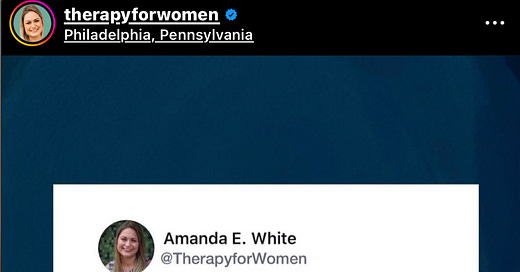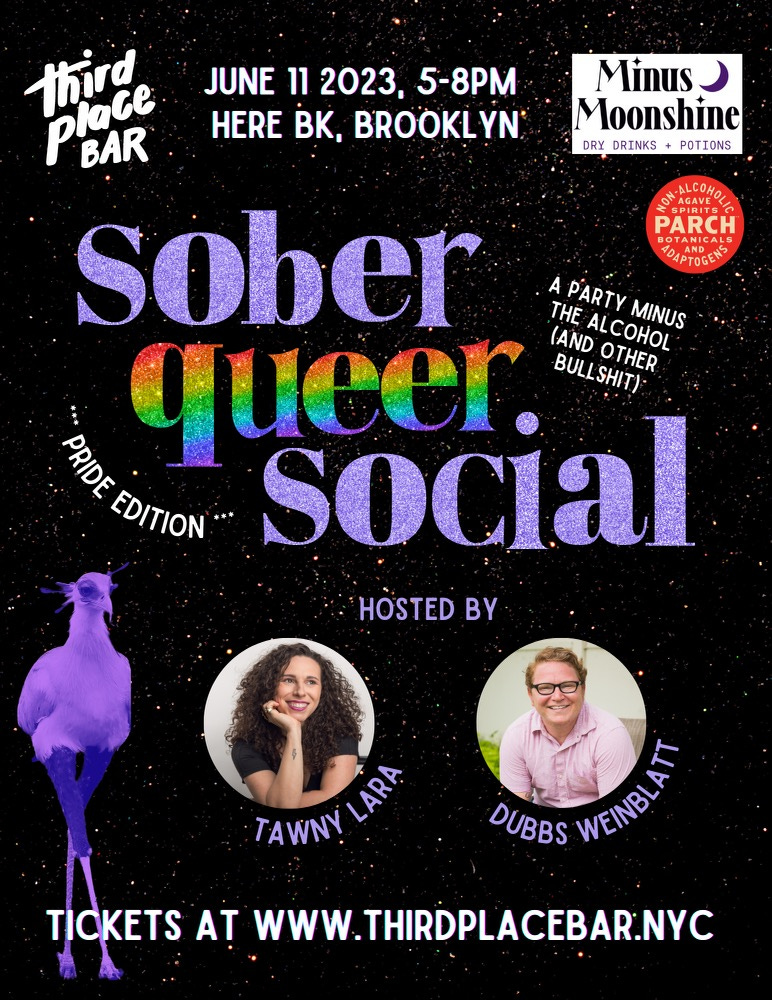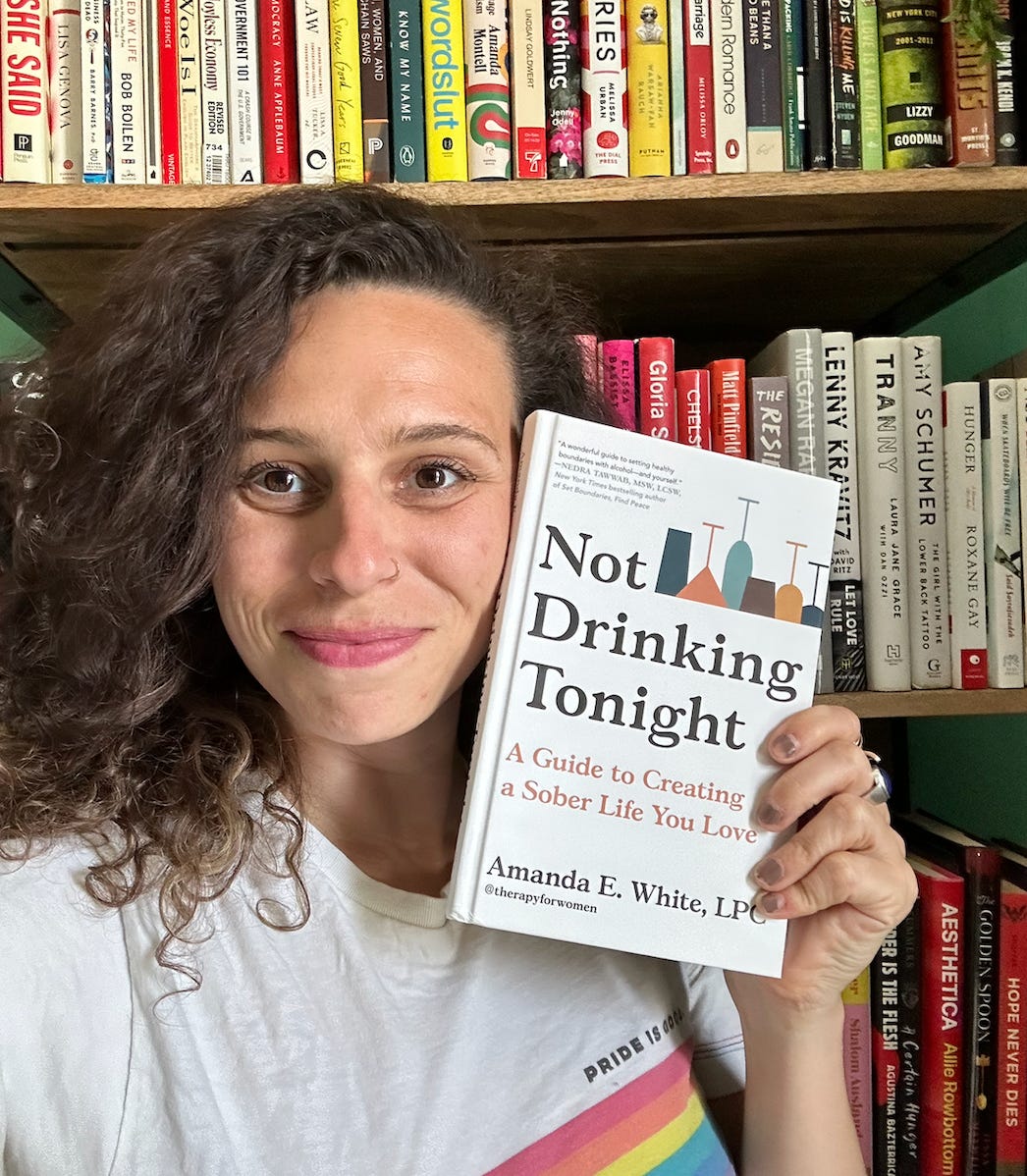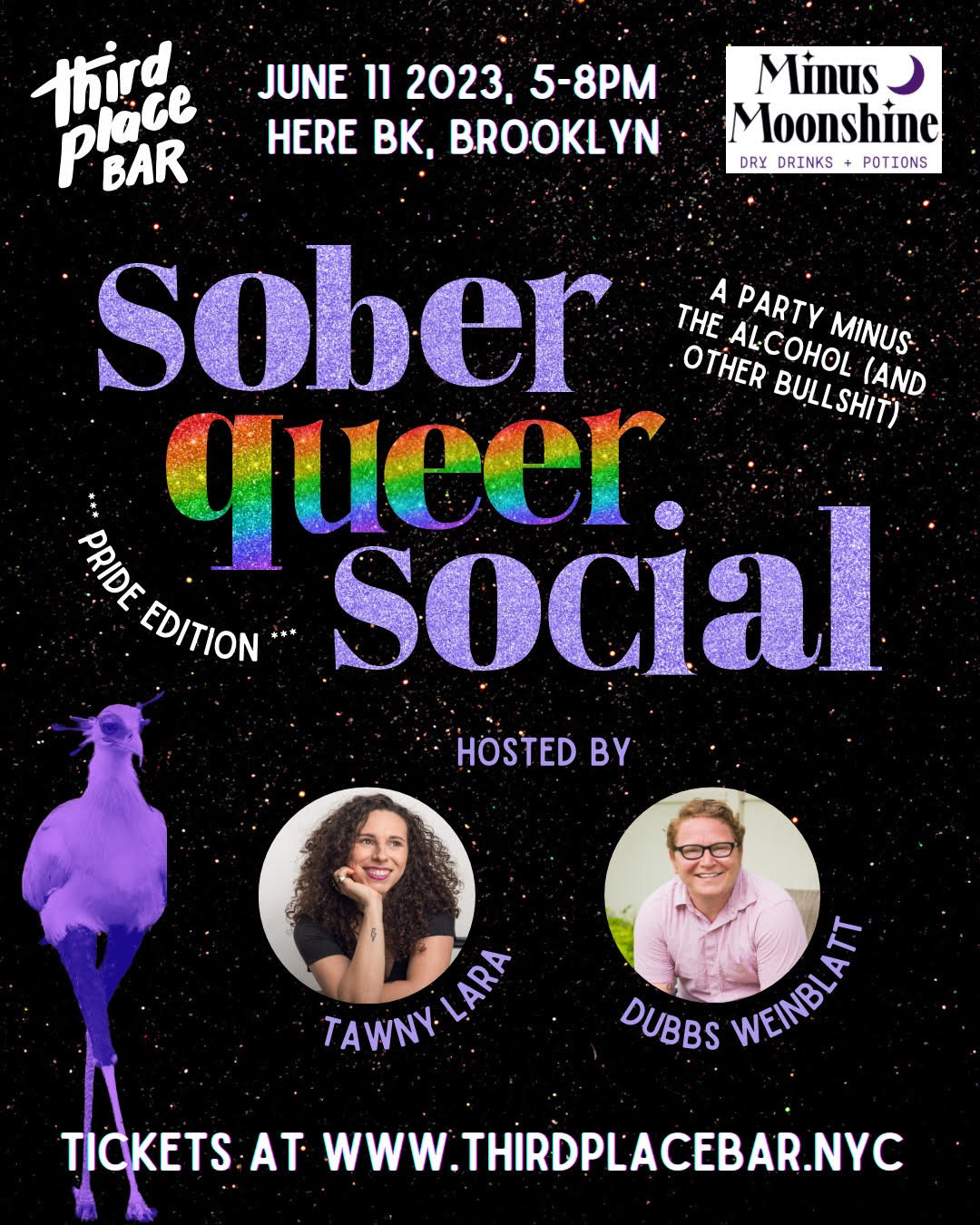Author Interview: Your Fave Instagram Therapist (Part 2)
Amanda E. White, LPC, talks liquid courage, healthy relationships, and productive fighting
Hey, y’all! Welcome to this paid subscriber-only edition of Beyond Liquid Courage. In addition to my free weekly column, where I answer subscriber questions about alcohol-free dating, intimacy, and relationships, these paid issues dive deeper into my life as a writer and provide resources to support you on your dry humping journey (wink wink).
Before we dive into Amanda’s interview, I want to let y’all know that I’m co-hosting a sober pride event on June 11th in Brooklyn! Grab your ticket here.
This bonus issue concludes a two-part interview with your favorite Instagram Therapist, Amanda E. White, LPC. You might already be one of the half a million people who follow her on Instagram, or have a copy of her incredible book, Not Drinking Tonight A Guide to Creating a Sober Life You Love. (And if not, what are you waiting for?!)
Amanda’s insight is particularly valuable because she has her own sobriety journey in addition to being a therapist who focuses on substance use disorder. I interviewed her for my book, Dry Humping: A Guide to Dating, Relating, and Hooking Up Without the Booze, and I wanted to share some of her wisdom here as a special preview.
This interview was condensed and edited for clarity.
What’s the difference between physical intimacy and emotional intimacy? And why is it important for someone who's in early sobriety or sober curiosity to learn that difference?
Emotional intimacy is about being vulnerable, sharing yourself with someone in a way that you wouldn't necessarily share with someone else. Like talking about your hopes, your fears, and what keeps you up at night. I think emotional intimacy is more important than physical intimacy because it builds throughout the relationship. If you can't give language to something, you can't change it.
It's important for people in early sobriety or sober curiosity to learn the difference between emotional intimacy and physical intimacy because a lot of people use physical intimacy as a crutch. To avoid their feelings, to avoid having hard conversations, to avoid being honest with themselves or someone else.
A lot of people use alcohol specifically as a way just to create physical intimacy. But it's not real intimacy. That's what your whole book is about, right? Is like how scary it can be to have sex when you're sober. I think it's important to know the difference so that you aren't using it as a crutch and avoiding your emotions.
How can someone be an ally to their partner's sober or sober curious journey?
Giving up alcohol is just the beginning. It's just about survival at first. Be compassionate. Come from a place of: How can I support you? What can we do together that would be helpful? Is going to a restaurant fun or triggering?
Also, allow your person to lead in what they need. Allow them to change. Help your person discover new things about themselves! Some of the hardest things happen when one person gets sober or sober curious, and their partner doesn’t. The relationship dynamic can really change when one person changes.
How can someone fight with their partner(s) in an effective way?
Most often, people communicate through blaming. Like, “You did this, you did that,” instead of taking responsibility for your emotions by using “I” statements. For example, “The story I'm telling myself is…” or “It occurs to me that…” You are taking responsibility for your interpretation of what's happening. There's a big difference, between “It feels like you don't care about me” versus saying, “You don't care about me.”
When you blame someone, you end up fighting about something else, not what you're actually dealing with. If I say, “You don't care about me,” my partner will respond with, “Yes, I do care about you,” And then I’m like, no, I don't. Yes, I do. No, I don't. Yes, I do. And that's not the point, right? The point is your feelings and what led you to feel like they don't care about you.
So often people don't actually fight about the problem, they fight about how they're fighting. So many people fight to be right. Remember that it’s you and your partner versus the problem instead of you versus your partner.
“Remember that it’s you and your partner versus the problem instead of you versus your partner.”
What are some healthy, booze-free ways that we can deal with breakups and heartaches?
Humans have always wanted to escape our pain. Your brain cares about surviving more than how successful you are. So it makes sense that we want to numb our pain, but at the end of the day, if you want to be able to work through this pain. Think about it like developing a tolerance of sitting with discomfort or working through your emotions, knowing that this will help you in the future.
Reconnecting with friends and community is so important when you're going through a breakup. You can also find healthy outlets to express your emotions through art, movement, or reading.
What’s the difference between numbing our pain and healthy distraction?
Distraction is intentional; there is a specific reason for it. We can't feel our emotions 24/7. We wouldn't be able to lead a productive life. You can’t always stop a meeting to go tend to your emotions. But you can distract yourself. For example, if you feel like you want a drink, set a time limit. Tell yourself, “OK, I'm going to watch this show for an hour or take a walk. Distracting yourself for a certain period of time can be a really healthy way to increase your pain tolerance.
How can people feel more sexually confident without alcohol?
I think it can be really powerful when someone realizes that they can have sex sober. They've never done it before, but they’re learning how to do it. It's a skill they can practice and build confidence. We often use alcohol as a substitute for not learning these skills. If you want to reduce your anxiety or increase your confidence, facing things that scare you is one of the most powerful things that you can do.
It’s common to think that you need to have sex a certain amount of times per week to be in a healthy, happy relationship. What are some other barometers of intimacy that we could put on our relationship?
People use sex as a barometer because it is definitive. You can count the number of times you had sex, but it's harder to come up with a barometer of how you feel with your partner. If both people are fine with the way that sexual intimacy is or isn't, then you don't need to change anything.
If Amanda’s interview interests you, her insight is sprinkled throughout my book, Dry Humping: A Guide to Dating, Relating and Hooking Up Without The Booze. Preorder now on Bookshop.org (every purchase helps to support a local bookstore) or your favorite retailer.
Until next time,
P.S. This issue was edited by Irina Gonzalez.
P.P.S. I’m co-hosting a sober pride event on June 11th in Brooklyn! Grab your ticket here.









Wow reading this helped me see a pattern I fall into a lot within all relationships in my life. Thanks for sharing this interview!